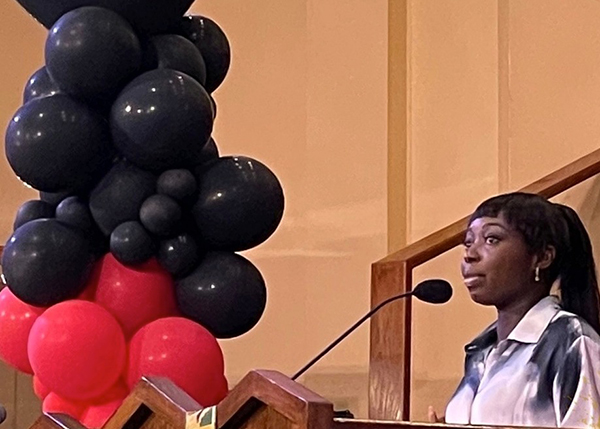By Janice Hayes Kyser
Contributing Writer
LOS ANGELES — When the Los Angeles Urban League was founded — by Dr. A.C. Garrott, a dentist; and Katherine J. Barr — its purpose was to improve the social and economic status of Black residents of the city.
That was in 1921 and the city has changed dramatically over the last century. While the organization has sometimes struggled to stay afloat, the mission and vision of the organization has never wavered.
As the Los Angeles Urban League celebrates 100 years of service with a series of programs and events throughout the remainder of this year, the organization’s leaders, community partners and activists say the league’s programs continue to play a pivotal role in leveling the playing field for people of color in the city.
“Our focus has always been about giving a voice to the Black community and disenfranchised people,” says Faye McClure, a Los Angeles insurance executive, business owner and a member of the Los Angeles Urban League Board of Directors. “Without the Urban League, our people wouldn’t have an advocate holding the community accountable. It is all about economic empowerment and equity, making sure both small and large employers are not just saying something, but doing something while also training the next generation of entrepreneurs and business people.”
Last year league officials say its construction training program and Behind the Scenes career training programs graduated 600 people — many of whom are now employed in well-paying jobs in the building trades and entertainment industries.
The league also conducts Biz Camp for youth to learn how to become their own boss. Participants write their own business plans and meet with local business leaders and entrepreneurs during the four-week course.
In addition to those initiatives, league officials say they are focusing on narrowing the digital divide that exists in communities of color and working with partners like Amazon to create more opportunities for Black and brown residents in the tech sector.
Los Angeles Urban League CEO Michael Lawson says the pandemic forced the organization, like many of the small businesses it supports, to move many of its training initiatives to a virtual platform. The league also helped Black businesses navigate the pandemic and worked along community partners to make the COVID vaccine accessible to the Black community and encourage residents to get the shot.
“The fact that we were able to pivot and continue to make a difference speaks to the stability and agility of our organization,” Lawson said.
Activist and author Earl Ofari Hutchinson, president of the Los Angeles Urban Policy Roundtable, said there is no doubt the Urban League has improved the economic standing of Blacks in the city through good times and bad.
“The [league] has played a vital role in enhancing Black economic life by providing job and business training and issuing its comprehensive annual State of Black America Report, which provides policy makers and donors a total view of the political, social and economic needs of underserved Black communities in our city,” Hutchinson said.
But, that hasn’t always been the case. In the mid-2000s when the economy plummeted and the league’s financial support dropped along with it, the local Urban League chapter was fighting for its survival. In order to stay afloat, the league realized it needed a leader with business acumen, commitment and connections so it tapped Noel Massey as board chair. Massey, who is now retired, was vice president of United Parcel Service in Los Angeles at the time and played an integral part in revitalizing the delivery service.
Massey set out to recruit a powerful board consisting of very accomplished lawyers, entrepreneurs and corporate executives with experience in both the public and private sectors. The new board then hired Lawson to be president and chief executive officer.
Lawson is an Ivy League-trained attorney who served as ambassador in the Obama administration and was appointed to the Los Angels Airport Commission by former Mayor Antonio Villaraigosa. The organization has had many high profile and well respected leaders over the years, including civil rights icon John Mack, who led the league from 1969 to 2005.
Massey recalls calling former Weingard Foundation President Fred Ali. who told him he would support the Urban League because he couldn’t imagine Los Angeles without it.
“He put it like this,” Massey said. “Los Angeles without the Urban League is like a city this size without a Children’s Hospital. It is too vital to the city’s health and well being to let it fail.”
With support from the Weingard Foundation and other community partners the Los Angeles Urban League spent the next decade focusing on strategy, execution and fundraising. Leaders say the organization is currently operating in the black and is meeting its goals.
Bob Binnie, head of community reinvestment for First Citizens Bank, says his company is proud to support the Urban League because it is a well-run organization that keeps its promises and has a long track record of success.
“Los Angeles is a relatively young city and for any institution to survive and thrive for 100 years is a testament to its leadership and mission,” Binnie said.
Lawson and his leadership team are committed to turning big ideas into reality. He and the board have an ambitious goal to create a Black Wall Street in Los Angeles, much like the Greenwood community in Tulsa, Oklahoma, that was destroyed in a race riot in 1921.
In the meantime, Lawson says he not only celebrates the big wins, he celebrates the little ones, too.
“I think about a young Black male who aged out of the foster system and was living in his car,” he said. “He graduated from our Backstage Careers program and is now working in the entertainment industry and making a good living and hopefully paying it forward because that is what it is all about.”
For more information about the Los Angeles Urban League, visit their website at www.laul.og.











